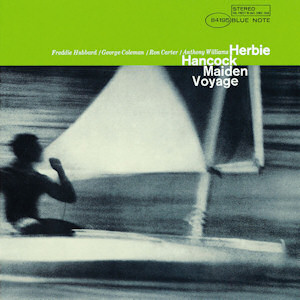
Maiden Voyage is the fifth album led by jazz musician Herbie Hancock, and was recorded by Rudy Van Gelder on March 17, 1965, for Blue Note Records. It was issued as BLP 4195 and BST 84195. Featuring Hancock with tenor saxophonist George Coleman, trumpeter Freddie Hubbard, bassist Ron Carter and drummer Tony Williams, it is a concept album aimed at creating an oceanic atmosphere. As such, many of the track titles refer to marine biology or the sea, and the musicians develop the concept through their use of space. The album was presented with the Grammy Hall of Fame Award in 1999.

Seven Steps to Heaven is the eighth studio album on Columbia Records by jazz musician Miles Davis, released in 1963, catalogue CL 2051 and CS 8851 in stereo. Recorded at Columbia's 30th Street Studios in Manhattan, and at Columbia Studios in Los Angeles, in sessions recorded in April of 1963, and May of 1963. It presents the Miles Davis Quintet in transition, with the New York session introducing the rhythm section of Herbie Hancock, Ron Carter and Tony Williams, who would become Davis' regular sidemen for the next five years. Upon release, the album was Davis' most successful on the Billboard pop LPs chart up to that point, peaking at number 62.

Miles Smiles is an album by jazz musician Miles Davis, released on February 16, 1967 on Columbia Records. It was recorded by Davis and his second quintet at Columbia 30th Street Studio in New York City on October 24 and October 25, 1966. It is the second of six albums recorded by Davis' second great quintet, which featured tenor saxophonist Wayne Shorter, pianist Herbie Hancock, bassist Ron Carter, and drummer Tony Williams.

Nefertiti is a studio album by American jazz musician Miles Davis, released in March 1968. Recorded at Columbia's 30th Street Studio over four dates between June 7 and July 19, 1967, the album was Davis' last fully acoustic album. Davis himself did not contribute any compositions- three were written by tenor saxophonist Wayne Shorter, two by pianist Herbie Hancock and one by drummer Tony Williams.
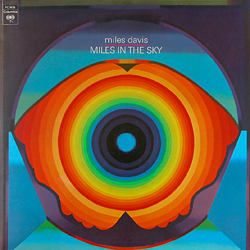
Miles in the Sky is a studio album by American trumpeter and composer Miles Davis, released on July 22, 1968, by Columbia Records. It was the last full album recorded by Davis' "Second Great Quintet" and marked the beginning of his foray into jazz fusion, with Herbie Hancock playing electric piano and Ron Carter playing electric bass guitar on opening track “Stuff”. Additionally, electric guitarist George Benson features on “Paraphernalia”.

George Edward Coleman is an American jazz saxophonist known for his work with Miles Davis and Herbie Hancock in the 1960s. In 2015, he was named an NEA Jazz Master.
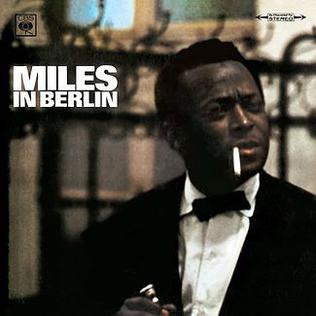
Miles in Berlin is an live album by Miles Davis performed at the Berliner Philharmonie on September 25, 1964 with his "Second Great Quintet," featuring tenor saxophonist Wayne Shorter, pianist Herbie Hancock, bassist Ron Carter and drummer Tony Williams, marking their first recorded work.

The Quintet is an album by V.S.O.P. It was compiled from two concert performances: one at the Greek Theatre, University of California, Berkeley, on July 16, 1977; the other at the San Diego Civic Theatre on July 18, 1977. The quintet were keyboardist Herbie Hancock, trumpeter Freddie Hubbard, drummer Tony Williams, bassist Ron Carter and saxophonist Wayne Shorter. The album was originally released in October 1977 as a 2-disc LP by Columbia Records.

A Tribute to Miles is a tribute album recorded by the then surviving members of the Miles Davis "Second Great" Quintet: pianist Herbie Hancock, saxophonist Wayne Shorter, bassist Ron Carter and drummer Tony Williams. Taking the Davis role was trumpeter Wallace Roney.

Quartet is the thirty-fourth album by jazz pianist Herbie Hancock, featuring a quartet with trumpeter Wynton Marsalis, bassist Ron Carter and drummer Tony Williams. It was originally issued in Japan on CBS/Sony, and later given a US release by Columbia.
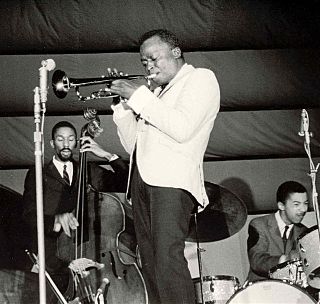
The Miles Davis Quintet was an American jazz band from 1955 to early 1969 led by Miles Davis. The quintet underwent frequent personnel changes toward its metamorphosis into a different ensemble in 1969. Most references pertain to two distinct and relatively stable bands: the First Great Quintet from 1955 to 1959, and the Second Great Quintet from late 1964 to early 1969, Davis being the only constant throughout.

Water Babies is a compilation album by American jazz trumpeter Miles Davis. It compiled music Davis recorded in studio sessions with his quintet in 1967 and 1968, including outtakes from his 1968 album Nefertiti and recordings that foreshadowed his direction on In a Silent Way (1969), while covering styles such as jazz fusion and post-bop. Water Babies was released by Columbia Records in 1976 after Davis had (temporarily) retired.

Seven Steps: The Complete Columbia Recordings of Miles Davis 1963–1964 is a box set of studio and concert recordings by Miles Davis for Columbia over a two-year period. Instead of focusing on a particular collaboration or session period, it focuses on the time period in between the solidified lineups of the first and second Great Quintets, starting with Ron Carter's introduction and finishing with the establishment of Wayne Shorter in the lineup.

Miles in Tokyo is a live album recorded on July 14, 1964, by the Miles Davis Quintet at the Tokyo Kōsei Nenkin Kaikan, Shinjuku, Tokyo, Japan. It was released in the United States on CD in 2005 and is the first recording of Davis in Japan. It is the only album to showcase an early incarnation of his Second Great Quintet featuring Sam Rivers on tenor saxophone, following George Coleman's departure; after this, Wayne Shorter's appointment completed the classic lineup which recorded such albums as ESP and Miles Smiles, through to Miles in the Sky.

The Essential Miles Davis is a 2-CD compilation album by Miles Davis released by Columbia Legacy on May 15, 2001. It belongs to Sony Music Entertainment's "The Essential" series, not to the series "Essentials", established by WEA International, and was released as part of Sony's Miles 75 Anniversary program. In 2008, The Essential Miles Davis 3.0 was released as a limited edition album featuring a bonus third disc that added five more songs to the original track list.

Quiet Nights is a studio album by jazz musician Miles Davis, and his fourth album collaboration with Gil Evans, released in 1963 on Columbia Records, catalogue CL 2106 and CS 8906 in stereo. Recorded mostly at Columbia's 30th Street Studios in Manhattan, it is the final album by Davis and Evans.

Miles Davis' Greatest Hits is a compilation album by Miles Davis originally released in 1969 and re-released in 1997 on CD with different recordings of tracks 3, 4 and 8.

Directions is a compilation album by American jazz musician Miles Davis, released in 1981 by Columbia Records. It collects previously unreleased outtakes that Davis recorded between 1960 and 1970. Directions was the last of a series of compilation albums—mostly consisting of, at that time, previously unreleased music—that Columbia released to bridge Davis' recording hiatus that ended with the Man with the Horn in July 1981.

Live at the 1963 Monterey Jazz Festival is a live album by Miles Davis recorded on September 20, 1963 and released July 31, 2007. Davis searched for new musicians for his quintet, after splitting with saxophonist John Coltrane in 1960. The new quintet consists of saxophonist George Coleman, pianist Herbie Hancock, bassist Ron Carter and drummer Tony Williams. It was recorded at the Monterey Jazz Festival in the early fall of 1963.
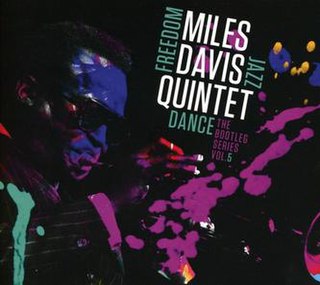
Miles Davis Quintet: Freedom Jazz Dance: The Bootleg Series, Vol. 5 is a 3-CD compilation that collects studio recordings by jazz trumpeter Miles Davis that were recorded between 1966 and 1968. The album contains remastered versions, alternate takes, and conversations among the musicians.




















